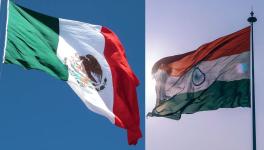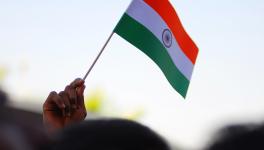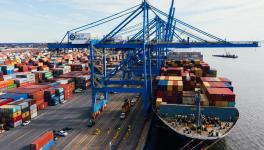The Diffident Emergence of The BRICS Bloc
The BRICS bloc wants to translate its new economic gains into political power, particularly by asserting itself as a leader for a new development dialogue, says Vijay Prashad.
The fifth BRICS Summit ended in Durban, South Africa, with minimal fanfare. Brazil, Russia, India, China and South Africa, the BRICS states, did not launch any major initiative. Even the much-anticipated BRICS Development Bank (point 9 of the eThekwini Declaration of the summit) was announced in a muted way - 'We have agreed to establish the New Development Bank.' This seems the style of the BRICS: a sort of shy entrance onto the world stage with no major policy alternatives slashed out with a major PR campaign.
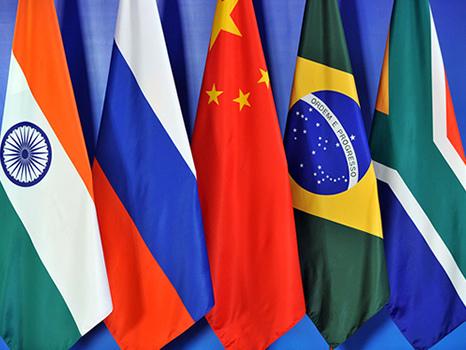
Image Courtesy: flickr.com
One of the reasons for this coyness is that the BRICS do not have a substantially new approach to world affairs, constrained as they are by the general adoption of neoliberal policies in their own countries and trapped as they are by a satanic cycle of low-cost production for the credit-fuelled enclaves of the Global North. The moist language of 'sustainable growth' and 'poverty alleviation' came alongside the same old bromides about the need to increase foreign direct investment, 'support growth and foster financial stability.' The good intentions of ending poverty are undermined by the mantra of Growth, given the emergent consensus view that the kind of growth strategies pursued in these states increase inequality rather than diminish poverty.
Despite its reticence, the BRICS agenda did mark a further shift in the relations of power on the global stage. Founded in 2009 out of the six-year preparatory work of the IBSA Dialogue (India-Brazil-South Africa), the BRICS bloc has over the course of its five summits put some daylight between its view of the world and that of the Global North. Incubating in the BRICS bloc is a new dispensation, although it remains firmly in place inside its chrysalis.
Putting daylight between South and North
The context for the emergence of the BRICS was the world credit crunch that began in 2007. A weakened North sought out the surplus-holding states of China and India to provide some of their liquidity to the International Monetary Fund (IMF) as a financial defibrillation for the United States and Europe. The North promised an expanded political role for the Southern giants through the G20 grouping of major economies, with an intimation that the G8 would be closed down in favour of this larger executive of planetary affairs.
But these promises came to naught, and the North began a policy of cheapening money, with central banks increasing global liquidity to bail out their struggling economies. These are strategies denied to the South during the Third World debt crisis in the 1980s and 1990s. The hypocrisy of the North is on the surface. There has been no 'structural adjustment' for the North; such policies remain obligatory only for the South. The policies in the North have, as the BRICS statement put it, produced 'negative spillover effects on other economies of the world,' with the liquidity in particular leading to 'increased volatility of capital flows, currencies and commodity prices, which may have negative growth effects on other economies, in particular developing countries.' The BRICS bloc indicates its dissatisfaction with the North's putative leadership over the planet's economy.
Exploring a new development initiative
The North-South Dialogue, the name for the development project of the 20th century, died an early death at the Canc£n Summit of 1981. Ronald Reagan and Margaret Thatcher came to that summit to promote free-market nostrums against any kind of comprehensive development agenda. Such glitzy initiatives as Bono's 'Make Poverty History' and the smoke-and-mirrors Millennium Development Goals have been no substitute for a comprehensive agenda for development in light of what we know about the ills of an unfettered neoliberal growth agenda and the perils of environmental degradation. The North has no stomach for such a development dialogue, blocking it at the various climate meetings and at the United Nations Conference on Trade and Development (UNCTAD).
The BRICS bloc wants to translate its new economic gains into political power, particularly in terms of asserting itself as a leader for a new development dialogue. Indications of an alternative approach to the free-market fundamentalism of the North have been evident at the BRICS forums and in the 2013 eThekwini Declaration. For example, the BRICS bloc does not obsessively put the good of the private sector above that of the public, with an acknowledgement of the 'important role that State Owned Companies (SOCs) play in the economy.' It is of course no longer the case that the public sector works entirely for the people's good either, with SOCs sometimes the hobbyhorse of the rich elites. Nevertheless, the public sector is a crucial avenue for social development in sectors such as education, health care and job creation. The state, as well, is necessary as a bulwark against speculative traders in commodity and currency markets, where the vicissitudes of nature are often manipulated for short-term financial gain rather than as insurance for the producers.
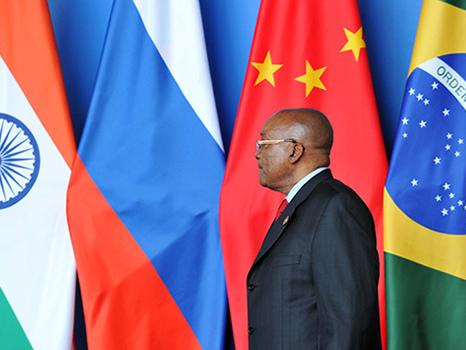
Image Courtesy: flickr.com
The BRICS bloc has created a $100 billion Contingency Reserve Arrangement to protect Southern states from short-term liquidity, a condition often used by the IMF to then demand that the cash-strapped countries adopt neoliberal policies ('conditionalities'). It is also the reason why the BRICS bloc has set up its Development Bank, although this was put on mute because the Indians and the Russians wanted more investigation of the Bank's potential impact.
Creation of its own institutions, the Contingency Reserve Arrangement and the BRICS Bank, is not a substitute for the BRICS states' own ambitions to take charge of the older institutions. Reform in the IMF has come to mean a greater voting share for the Southern states. Last year, in Doha, the North, led by the Swiss, attempted to scuttle the mandate of UNCTAD, pushing it to set aside its own views on financial sector reform. The BRICS in the Delhi Declaration (2012) and now in the eThekwini Declaration reaffirm the work of UNCTAD on the 'interrelated issues of trade, investment, finance and technology from a development perspective.' The crucial words here are 'interrelated' and 'finance', indications of the verdict of UNCTAD's Trade and Development Report 2011 which pointed out that it is the speculative power of global finance that has not only created economic dustbowls in the North but also hindered any development project for the South.
Towards multi-polar regionalism
The most important indications from the BRICS summits of the past two years have been the emergence of these states into grave international crises. The BRICS bloc in Delhi and now in eThekwini waded into the Israel-Palestine dispute and the Syrian bloodbath, the radical manoeuvres against Iran by the North and its attempt to extricate itself from an Afghanistan that its wars have substantially destroyed, the silent interventions in Congo and the turbulent situation in Mali.
There is no clear-cut policy alternative in the seven paragraphs on the seven conflict zones taken up by the BRICS. But, reading between the lines, one can detect an emergent doctrine: towards multi-polar regionalism rather than a Northern-dominated world order. The regional bodies, the Arab League and the African Union for instance, have been substantially undermined and cynically utilised for agendas that do not benefit their own regions. There is a sentiment in the BRICS blocs to rejuvenate these regional bodies, although, as with the case of Afghanistan, there are hegemonic ambitions of the BRICS states themselves that make genuine, horizontal regionalism impossible to imagine in the short run.
The BRICS bloc has now arrived on the world stage. Mockery from the North Atlantic media reveals only its own parochialism. The BRICS states themselves have done little to promote their agenda. When the BRICS summit took place in Delhi, there was little attempt to reach out to the Indian public to introduce it to the process; a similar silence was resounding in South Africa. When the Non-Aligned Summit took place in Delhi in 1983, I recall billboards announcing the event, radio and television anchors covering the proceedings and newspapers giving the deliberations full coverage. It is almost as if such attention bespeaks an earlier, and to the current leadership, embarrassing, age of Third World solidarity.
It tells you something about the silently undemocratic sentiment of the new epoch that such major changes are afoot and there is little care to introduce the public to them. This is a mirror of the kind of political ecology inhabited by the BRICS: they are reticent and the North is contemptuous. But that reticence, as the BRICS agenda reveals, might not be a permanent condition.
Disclaimer: The views expressed here are the author's personal views, and do not necessarily represent the views of Newsclick
Vijay Prashad is the author of The Poorer Nations: A Possible History of the Global South, out now from Verso Books.
Get the latest reports & analysis with people's perspective on Protests, movements & deep analytical videos, discussions of the current affairs in your Telegram app. Subscribe to NewsClick's Telegram channel & get Real-Time updates on stories, as they get published on our website.










